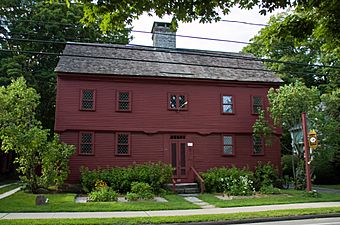Hyland House Museum facts for kids
|
Hyland–Wildman House
|
|
|
U.S. Historic district
Contributing property |
|
 |
|
| Location | 84 Boston St., Guilford, Connecticut |
|---|---|
| Area | 1 acre (0.40 ha) |
| Built | 1713 |
| Architect | Parmelee, Isaac |
| Architectural style | Colonial |
| Website | http://hylandhouse.org |
| Part of | Guilford Historic Town Center (ID76001988) |
| NRHP reference No. | 76001989 |
Quick facts for kids Significant dates |
|
| Added to NRHP | March 26, 1976 |
| Designated CP | July 6, 1976 |
The Hyland House Museum, also known as the Hyland–Wildman House, is a historic house museum located at 84 Boston Road in Guilford, Connecticut. This amazing old house was built in 1713. It is one of the best-preserved homes from that time in Guilford.
Since 1918, the Hyland House has been open to the public as a museum. A local group that works to save old buildings helps run it. In 1976, the house was added to the National Register of Historic Places. This means it is recognized as an important historical site. Inside, you can see furniture and items from the Colonial period.
What Makes the Hyland House Special?
The Hyland House is just a short walk east of Guilford's main town green. It sits on the north side of Boston Street. This house is two and a half stories tall and made of wood. It has a pointed roof, a stone chimney in the middle, and wooden boards on the outside.
Unique Design Features
The front of the house has five window sections. Small-paned windows with diamond shapes are placed evenly around the main door. The door itself has a simple frame. Above the door, there is a window with four small panes. The back roof of the house goes all the way down to the first floor. This gives the house a classic New England "saltbox" shape. Inside, you might notice the special decorated wooden beams called "girts." These are thought to be one of the earliest examples of this kind of decoration.
A Look at Its History
For a long time, people thought the Hyland House was built around 1660. They believed a builder named George Hyland constructed a house on this land then. However, scientists used a method called tree-ring dating on the main wooden beams. This showed that the house was actually built around 1713. It was likely built by Isaac Parmelee, who owned the land at that time.
The house went through a big restoration in 1917. This means it was carefully repaired and brought back to its original look. An expert in old buildings, Norman Isham, led this work. The money for the restoration came from the Society for the Preservation of New England Antiquities. This group is now known as Historic New England.
See Also
 | Misty Copeland |
 | Raven Wilkinson |
 | Debra Austin |
 | Aesha Ash |



